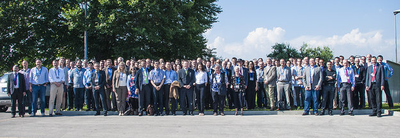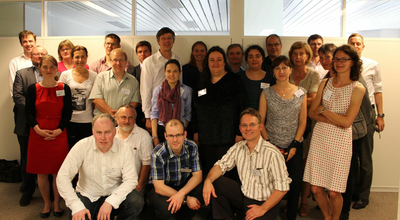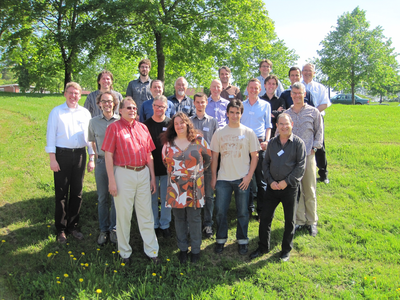Policy-makers and science and industry representatives are discussing how to make large amounts of Earth observation data accessible to a wider user community. To explore this idea, some 250 science, industry and policy-making representatives and national delegates from Europe, the US, Australia, China and Africa met at ESA’s ESRIN centre in Frascati, Italy last week for ESA’s first ‘Big Data from Space’ event.
Representatives from ESA and NASA opened the event together with the European Commission. European Commission Directorates-General for Enterprise and Industry, Research and Innovation and Communications Networks, Content and Technology, along with representatives from the European Environment Agency, the National Oceanic and Atmospheric Administration and the Open Geospatial Consortium acted as session chairs.
Javier de la Torre, representing the EU BON partner Vizzuality gave a presentation 'Global Deforestation through Timeme: Big Data Meets Scalable Visualizations,' which included some of the work Vizzuality is doing toward the EUBON project.
The event concluded with a strong call by all parties for the ability to handle and use big Earth observing data. This could potentially open new opportunities for research and international cooperation schemes such as programmatic and industrial coordination.

Too many data-management projects fail because they ignore the changing nature of life-sciences data, argues .
From: Nature/Column: World View
The size, complexity and heterogeneity of the data generated in labs across the world can only increase, and the introduction of cloud computing will encourage the same mistakes. Just a stone's throw from where I work, at least three computer companies are already touting cloud-based data-management systems for the life sciences. We need to find ways to manage and integrate data to make discoveries in fields such as genomics, and we need to do this quickly.
At their most basic, data-management systems allow people to organize and share information. In the case of small amounts of uniform data from a single experiment, this can be done with a spreadsheet. But with multiple experiments that produce diverse data — on gene expression, metabolites and protein abundance, for example — we need something more sophisticated.
An ideal data-management system would store data, provide common and secure access methods, and allow for linking, annotation and a way to query and retrieve information. It would be able to cope with data in different locations — on remote servers, on desktops, in a database or spread across different machines — and formats, including spreadsheets, badly named files, blogs or even scanned-in notebooks.
Read the full article here.
Origial Source: Nature 499, 7 (04 July 2013) doi:10.1038/499007a
The Group on Earth Observations Biodiversity Observation Network (GEO BON) is leading the development of a set of Essential Biodiversity Variables (EBVs), akin to the GCOS Essential Climate Variables (ECVs).
The recently published paper (Science 339, 18 January 2013) describing the EBV concept states that: "Reducing the rate of biodiversity loss and averting dangerous biodiversity change are international goals, reasserted by the Aichi Targets for 2020 by Parties to the United Nations (UN) Convention on Biological Diversity (CBD).… However, there is no global, harmonized observation system for delivering regular, timely data on biodiversity change." Read Full Paper and supplementary materials on EBVs here.
GEO BON partners are thus developing (and seeking consensus around) EBVs that could form the basis of monitoring programs worldwide. For more information on EBVs please click here.
GEO BON invites anyone who would like to get involved in EBV development, to take the EBV survey which will run till 31 August 2013. The survey will help us gauge how respondents feel about current candidate EBVs and provides respondents with the opportunity to make suggestions for new/alternative EBVs. Complete survey now!
In this guest post Martin Sharman opens up a rich area of debate by arguing that as a policy concept, ecosystem services puts human wants first and foremost and undermines moral-aesthetic value arguments for conservation that are widely held in society. Martin was the policy offer responsible for biodiversity and ecosystems in the European Commission’s DG Research & Innovation up until his retirement last November. During his career he made an enormous contribution to biodiversity research and policy, including the initiation of the BioFresh project. The opinions expressed in this post are, of course, his own and are not intended to represent a position of either the Commission or BioFresh.
A "resource" is something that is useful to someone. A "natural resource" is something in the natural environment that a human can use to satisfy want or increase wellbeing.
To adopt this vocabulary is to adopt a forthright utilitarian view of the natural environment, and implicitly to accept that human benefit is the only good. Not only is human benefit the only good, but it is quantifiable – for if not, then we can never agree on what constitutes a resource, or who has the greater right to it. Thus someone who speaks of natural resources accepts, again implicitly, that happiness and wellbeing can be quantified. The vocabulary also requires that this quantified human benefit remains, if not constant, then comparable over cultures and generations.
More than this: the wellbeing of the "resource" is insignificant. It is only by setting concern for the wellbeing of the resource to zero that one can regard it as merely something to satisfy human want. Human benefit is the only good. This is the First Commandment; in the limpid words of the King James version of the bible, thou shalt have no other gods before me.
In this observation lies much of the moral argument against the concept of ecosystem services: just as oranges are not the only fruit, so humans are not the only species.
The concept of ecosystem services is one thing; the premise of its proponents is another. It is, in short, that conservation based on intrinsic value of biodiversity has failed to stop the loss of species, ecosystems, and the complex web of interactions between them. Since an ethical argument has failed, then we should try self-interest. By demonstrating that human wellbeing is increased by the services rendered by ecosystems, we can motivate people to protect the source of the service – biodiversity.
We know that conservation is not working because we continue to lose biodiversity. Oh yeah? This is the equivalent of me deciding that my accelerator is not working because my car is losing speed. Why is such a daft non-sequitur accepted by otherwise intelligent people? You immediately thought of many reasons my car might be losing speed – I have the brakes on, I’m going up a hill, I’ve run out of fuel, I’ve run into sand, I’ve hit an oncoming truck. The obvious reason that we are losing biodiversity is the memento mori that stares at us from our looking glass – biodiversity loss is the inevitable result of our debt-based economic system and our swelling population’s unsustainable demands on nature. We all know that. Why do we mutely accept the dangerously diversionary nonsense that "biodiversity is being lost because conservation is not working"?
Ecosystem services takes the utilitarian logic of natural resources one important step further. A "service" by definition benefits humans. If we are to protect services only if they benefit humans, then what happens to the useless ecosystems? Are they simply to be cemented over?
I recently heard a discussion in which one person said "most people are useless", meaning that they are surplus to requirement. The outrage that this provoked was spearheaded by someone saying that you can never prove that anyone is useless, because you can never know enough about their contribution to their social fabric. So does this mean that you can never show that an ecosystem is useless? If so that leaves the ecosystem services argument saying that because some ecosystems benefit humans, we have to protect every ecosystem.
Which may be the right answer, but why reach it by such objectionable means?
For those of us with a reverence of nature, the ecosystem services rhetoric and mindset are abhorrent, being fundamentally immoral and unethical. They take the most ecologically damaging invasive species in the history of life, and place it above all other species on Earth. They cast all other – voiceless – species in the role of consumables. This mindset might have worked for Homo habilis. It will not work for Homo sapiens.
Martin Sharman for the BioFresh Blog: http://biofreshblog.com/2013/07/03/perspective-martin-sharman-on-ethics-and-the-ecosystem-services-paradigm/
The University of Cambridge invites for applications for a Research Associate to work on EU-BON, a major EU-funded research project seeking to improve the use of biodiversity data in public policy.
Applicants should have a PhD in a relevant social science or conservation science. Experience in both qualitative and quantitative analysis is desirable. Applicants should ideally have some first-hand experience of public policy processes and a willingness to travel within the European Union for research. Excellent organisational and communication skills will be essential in working as a successful part of this large, multi-partner and multinational team.
The researcher will carry out research on how biodiversity data is currently used in European policy making and will contribute to analysis of the opportunities to increase its effective provision and use. Research methods are likely to combine qualitative and quantitate analysis and to focus on the use of biodiversity data in public policy contexts. It is expected that some of the research will take place in Brussels. The researcher will have considerable freedom in defining the research project in discussion with Dr Doubleday and Prof Sutherland. In addition to carrying out research on the use of biodiversity data in European policy making, the researcher will support Cambridge's contribution to EU BON as a whole. This will involve contributing to other workpackages as and when required. More information about EU BON can be found here: http://www.eubon.eu
Fixed-term: The funds for this post are available for 36 months in the first instance.
Completed applications consisting of a CHRIS/6 (Parts I & III) (downloadable from http://www.admin.cam.ac.uk/offices/hr/forms/chris6/) a covering letter, and CV, should be sent to Danielle Feger, via email: geogrec@hermes.cam.ac.uk or sent to Research Administrator, Department of Geography, Downing Site, Cambridge, CB2 3EN
Please quote reference LC01355 on your application and in any correspondence about this vacancy.
Any enquiries concerning the position can be made to Dr Robert Doubleday, rob.doubleday@csap.cam.ac.uk
For more information about the position, please visit: http://www.jobs.cam.ac.uk/job/1611/
The Brazilian initiative PPBio (The Program for Research on Biodiversity) launches a new book based on over a decade of experience in implementing the biodiversity monitoring system RAPELD in the Brazilian Amazon. Richly illustrated and written in simple language, the book "Biodiversity and Integrated Environmental Monitoring" addresses the issues that led to the system development, covering topics such as the spatial organization and representation of biological diversity, environmental monitoring, and data management.
Monitoring of biodiversity is not merely an academic endeavor. Although scientific aspects such as representation of biodiversity and biodiversity data integration, management and preservation are of a great importance, it is also essential to think about the political context in which decisions will be made and how to incorporate political stakeholders and decision makers.
"As this important book makes clear questions about biodiversity are far from purely scientific. Biodiversity matters. Our needs to assess it embed in a complex of questions posed by managers, policy makers and those who live in or otherwise benefit from biodiversity.", explains Dr Stuart L. Pimm in the preface of the book. "So how do we ensure that data collected now will be useful for purposes we cannot yet imagine at some unexpected time in the future? Or provide comparison to some other place that we might survey some day?"
Those and many more questions regarding biodiversity data management and policy involvement are discussed in the new book "Biodiversity and Integrated Environmental Monitoring".
The first EU BON Stakeholder Round Table was held on 18 June 2013 at the Leibniz Association in Brussels, under the motto "Requirements for Policy".
Important topics regarding biodiversity information were discussed with political stakeholders and a variety of valuable recommendations were given for the future process of EU BON. Among the participants were members of the European policy, representatives of recent European biodiversity projects and EU BON members. At the round table, intensive discussions took place regarding what biodiversity policy needs, like which indicators and measurements are needed to answer burning policy questions. Suggestions were made to formalize Essential Biodiversity Variables (EBV’s) and Aichi targets. A future approach was set towards producing a guideline and timeline for indicators that should be established within EU BON.
The challenges of future research policy were also discussed and the collaboration of EU BON with the Group on Earth Observations (GEO) will be a substantial part of the continuous contributions to the global process. EU BON should also serve as a showcase for the European Commission in this respect. EU BON will also be responsible for answering crucial questions regarding data policy, e.g. how to establish a general repository for a long-lasting storage of data and how to handle ‘big data’. Another future task will be to integrate EU relevant projects and initiatives and their data portals, datasets and metadata.
At the round table it was also discussed how public stakeholders can be involved in the future, particularly citizen scientists, so that they could be integrated in EU BON and provide useful information for scientists and researchers.
Among the participants were representatives of major biodiversity stakeholders including Gilles Ollier, Jane Shiel and Sofie Vandewoestijne - European Commission, DG Research and Innovation; Anne Teller - European Commission, DG Environment; Georgios Sarantakos - GEO Secretariat; Cigdem Adem - European Environment Agency; representatives of recent European biodiversity projects (FunDiv, BioFresh, STEP and INSPIRE) and EU BON members.
Presentations:

The Norwegian Biodiversity Information Centre (NBIC) was host to an international biodiversity informatics workshop May 29th-31st. The event was held as part of the EU-project European Biodiversity Observation Network (EU BON), where NBIC is a partner.
The theme for the ‘EU BON Initial Informatics Workshop’ was data architectures, standards and interoperability (improving flow of information between systems). The event gathered renowned international and national experts within data structures for biological data.
EU-project for better data flow
NBIC is the Norwegian partner in EU BON, an EU-project spanning 5 years where 30 institutions from 18 countries contribute. The objective is to build an infrastructure that improves the flow of biodiversity data in all of Europe. Furthermore, the project is a European affiliate to its global counterpart (GEO BON) and will contribute to the work of the newly established ‘Intergovernmental Platform on Biodiversity and Ecosystem Services’ (IPBES).
Good solutions showcased
Worldwide, a large number distinct standards and solutions for management of data on species and nature types exist, and one of EU BON’s objectives is to find solutions to get all of these systems to communicate with one another. Several attendees contributed with presentations highlighting diverse standards and solutions for interoperability. Additionally, four international players in the field of biodiversity informatics presented general international initiatives, projects and services relevant to EU BON.
What is biodiversity informatics?
Biodiversity informatics is the field of applying IT techniques to improve management and presentation of biodiversity information, making it easier to discover, use and analyze such data.
The EUBrazilOpenBio project announces two new training tools as a part of its e-training Programme aiming at educating and enabling current and potential users of EUBrazilOpenBio to unlock new knowledge and shape effective policy on biodiversity challenges. The new tools cover the following use cases: Ecological Niche Modeling and Cross-mapping.
The EUBrazilOpenBio anytime, anywhere eTraining tools are designed for researchers in the spheres of Biodiversity, Life science, Climate Change, application Developers as well as regulatory authorities and policy decision-makers.
EUBrazilOpenBio is focused on tackling the complexity of biodiversity science such as the diversity of multidisciplinary datasets spanning from climatology to earth sciences by integrating advanced computing resources with data sources across Europe and Brazil.
For more informationand to try out the new tools click here.
The first EU BON Stakeholder Round Table is now approaching. The workshop will take place in Brussels on 18 June 2013 and be hosted by the Leibniz Association. A main obstacle to reach the 2010 biodiversity goals and to implement the European Biodiversity Strategy is the lacking integration of biodiversity aspects into political, economic, and management decisions in different sectors mainly due to knowledge gaps. The aim of the 1-day workshop will be to identify existing gaps, determine current needs regarding biodiversity information and develop solutions to overcome the existing knowledge gaps within the EU BON project.
EU BON will provide access to biodiversity information that is reliable, relevant, up-to-date, and publicly available. In the first Stakeholder Round Table, the EU BON approach for establishing a European Biodiversity Observation Network will be outlined. Based on that introduction, existing approaches that compile biodiversity or biodiversity-relevant data and the possible synergies and possible contributions to EU BON will be discussed. Another important aspect of the meeting will be to highlight the link to policy and governments of the European Union and their specific needs regarding biodiversity information.
Results of this first stakeholder round table will be documented and passed back to the project in order to increase its relevance. Next stakeholder round tables can be used to evaluate the progress of the project with regard to serving the demands of EC, EEA, GEO BON, IPBES, JRC and other stakeholders.
The first Informatics Workshop of the EU-FP7 funded project EU BON was held on 29-31 May 2013 in Trondheim, Norway. The meeting was hosted by the EU BON partner Norwegian Biodiversity Information Centre (NBIC). The aims were to highlight the link to infrastructures and processes like GEOSS or DataONE and to discuss the data standards and informatics architecture that will be followed by the EU BON project.
During the three-days of the workshop, the participants of the meeting discussed the important aspects regarding the informatics architecture and decided on the next steps to develop a new open-access platform for sharing biodiversity data and tools in order to advance the European biodiversity knowledge. On the first day, the aim was to highlight the link of EU BON with GEOSS, GEO BON and other processes like DataONE to find synergies and to build on work that was conducted in these processes. On the second day, detailed discussion on the specific tasks of the workgroup took place. The afternoon session was split into 3 different tracks where issues like architectural design, review and guidelines for using data standards, the design of monitoring sites and the gap analysis of existing biodiversity data were analyzed and discussed.
It was agreed that a new platform is needed which should be built on existing solutions. Thus, the platform will use the technical solutions of the DataONE network that will be adjusted to the specific needs of the EU BON project. EU BON Partners will implement DataONE Member Nodes to start the process and a DataOne coordinating node may be established towards 2015. Furthermore, it was also decided to join and support the GEO BON Working Group pilot project on automating the data flows for the Essential Biodiversity Variables.

Science for Environment Policy features a policy brief explaining the biases around biodiversity databases in their latest issue 331, from 6 June 2013. "Biodiversity databases: language and location help explain biases" features a new study arguing that low numbers of English speakers, large distances from the database host and low security acting as key barriers to data collection and among the main reasons for the underrepresentation of some countries in biodiversity databases.
Source: Amano T., Sutherland W.J. (2013) Four barriers to the global understanding of biodiversity conservation: wealth, language, geographical location and security. Proceedings of the Royal Society B. 280: 20122649. doi: 10.1098/rspb.2012.2649




 RSS news
RSS news



 Postdoctoral position on species and population dynamics at Doñana Biological Station
Postdoctoral position on species and population dynamics at Doñana Biological Station






